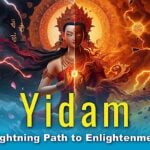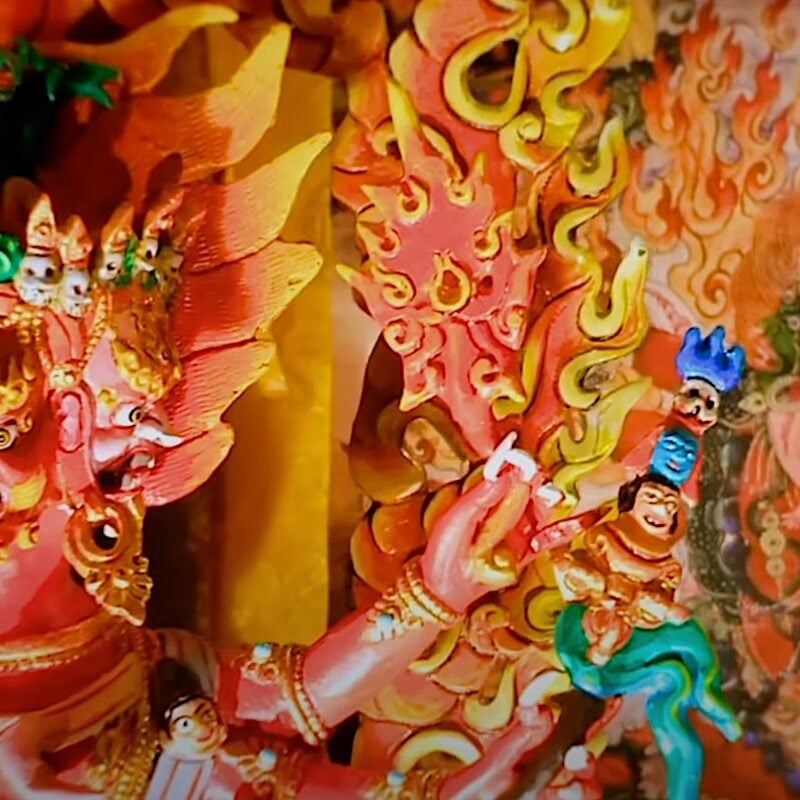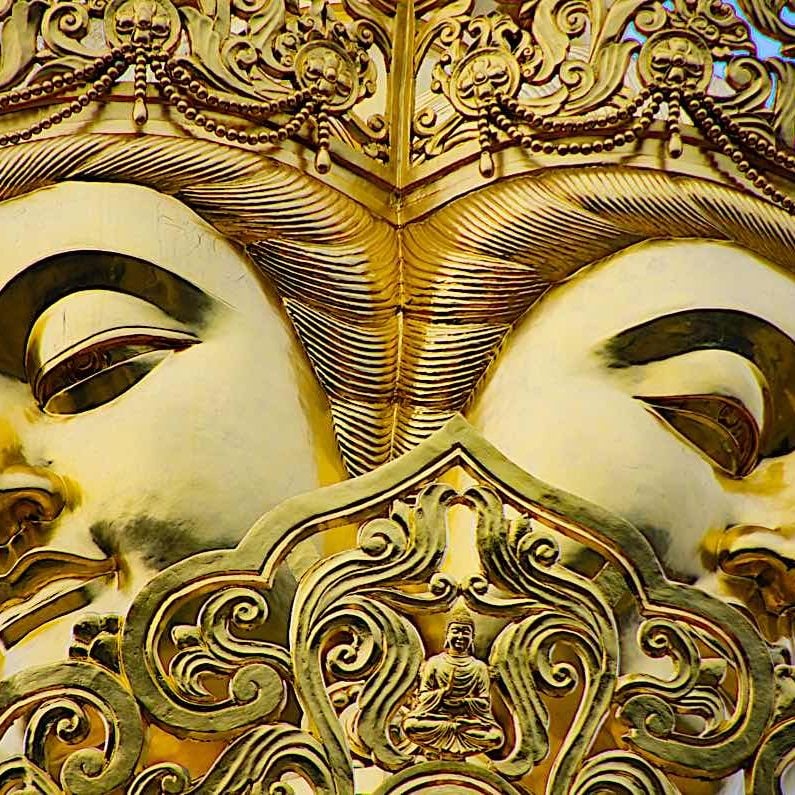Stream of Gems Vasudhārā: The Buddhist Tara Goddess of Wealth and Prosperity; Mother Earth Who Witnessed Buddha’s Enlightenment
Vasudhārā’s name is a melodious Sanskrit phrase that translates to “stream of gems”. Thinking of Her as the Stream-of-Gems Tara paints a picture of abundant wealth and prosperity. Why is Prosperity and Wealth so vital to Buddhist practice?

Vasudhārā: The Buddhist Goddess of Wealth and Prosperity
The goal of stable livelihood for the lay Buddhist is a noble one, enabling Buddhists to support the dedicated monastic community, and providing stability in life that gives the practitioner the ability to help others. Golden Vasudhara Tara is not about greedily asking for more, and more, but rather about attaining more so that we can give and give. The poison of greed is overcome by generosity — which is only possible if we have a stable livelihood.
Vasudhārā embodies these exact ideals, standing tall as the Buddhist Goddess of wealth, prosperity, and abundance. A popular form of Yellow Tara, she is none other than Mother Earth herself who nurtures, sustains, and enriches.
As described in this Sakya praise:
“Bhagavani, source of all wonders, Vasudhara, goddess of splendour and fortune, bestower of auspicious mental desires; homage to the Goddess Wish-fulfilling Wheel.”

Names of Vasudhara Around the World
| Sanskrit | Vasudhārā’ |
|---|---|
| Pali | Vasundharā |
| Tibetan | ནོར་རྒྱུན་མ་ Wylie: nor rgyun maor Drolma Sermo |
| Burmese | Wathondare (ဝသုန္ဓရေ) Wathondara (ဝသုန္ဓရာ) |
| Khmer | Neang Konghing (នាងគង្ហីង) Preah Thoroni (ព្រះធរណី) Preah Mae Thoroni (ព្រះម៉ែធរណី) |
| Thai | Vasundharā (พระแม่ธรณี) Mae Phra Thorani (แม่พระธรณี) Nang Thorani (นางธรณี) |
| Chinese | (Traditional) 持世菩薩 (Simplified) 持世菩萨 (Pinyin: Chíshì Púsà) (Traditional) 財源天母 (Simplified) 财源天母 (Pinyin: Cáiyuán Tiānmǔ) |
| Greek Equivalent | Gaia |
| Japanese | 持世菩薩(じせぼさつ) (romaji: Jise Bosatsu) |
| Korean | 지세보살 (RR: Jije Bosal) |
| Tagalog | Basudhala |
| Vietnamese | Trì Thế Bồ Tát |
| Roman Equivalent | Terra |
- For more on her Gold Tara Who Bestows Wealth (11th Tara of 21) see the section below with her practice and mantra.
Vasudhara, the Witness of Buddha under the Bodhi Tree
Vasudhara is also known as Prithvi, or Pṛthvī Mātā (‘Mother Earth’) who protected Gautama Buddha and was his witness before Mara. Prithvi appears in Early Buddhism in the Pāli Canon, dispelling the temptation figure Mara by attesting to Gautama Buddha’s worthiness to attain enlightenment.

This is the most famous pose of Gautama Buddha — with his hand touching the earth, the Bhumisparsha Mudra. Bhumi means earth Mother, and through the next few decades of Buddha’s life, he would remain close to Mother Earth and dwelled mostly in the forests of Mother Tara [Green Tara is Tara of the Khaidira Forest).
In his moment of Realizations under the Bodhi Tree, Buddha calls on Mother Earth, none other than Vasudhara Prithvi Tara, as his witness. Mara, the great tempter who assailed Buddha with offers of wealth and power, was silenced by Vasudhara Prithvi’s witness [Source Mahāvastu (Sanskrit for “Great Event” or “Great Story” Sutra]:
He now let his right hand slide over his entire body and then gracefully tapped on the
earth. He then spoke this verse:“This earth supports all beings;
She is impartial and unbiased toward all, whether moving or still.
She is my witness that I speak no lies;
So may she bear my witness.”
As soon as the Bodhisattva touched this great earth, Vasudhara shook in six different ways. She quivered, trembled, and quaked, and she boomed, thundered, and roared.
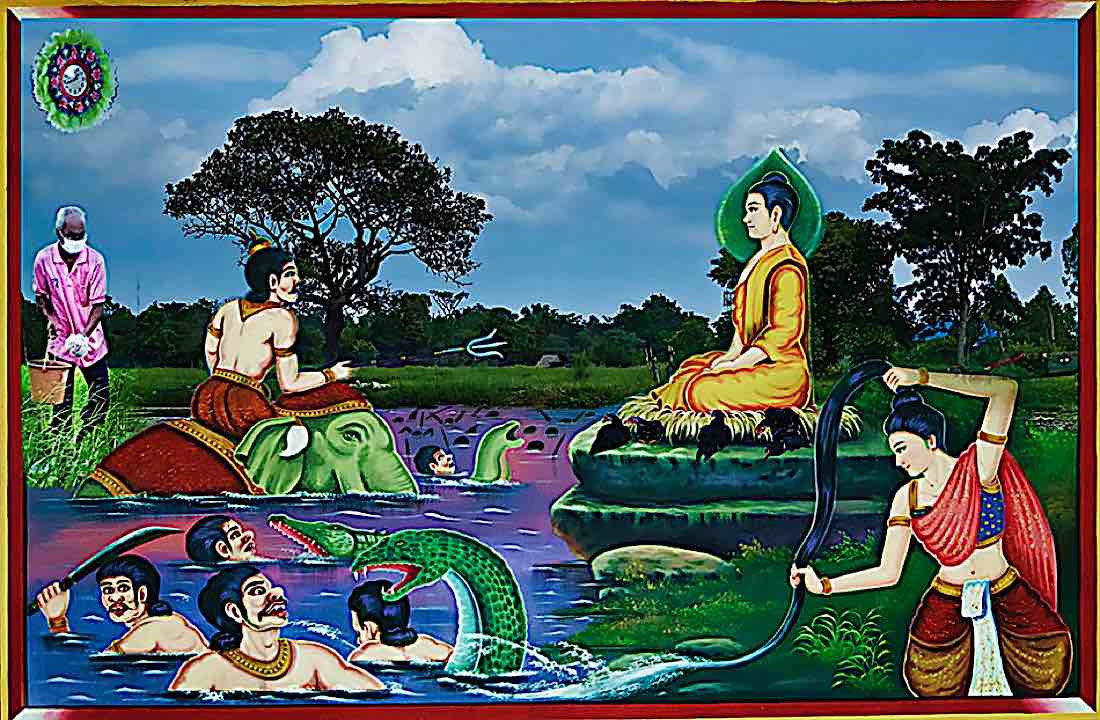
In the temple murals of Southeast Asia, Vasudhara Phra Mae Thorani is often portrayed alongside Buddha, who is in the pose referred to as “invoking the earth as witness”. The boundless streams of water emerging from her dazzling hair cleanse the ground of Mara’s armies, embodying the bodhisattva’s profound act of selflessness, often referred to as dāna paramī.
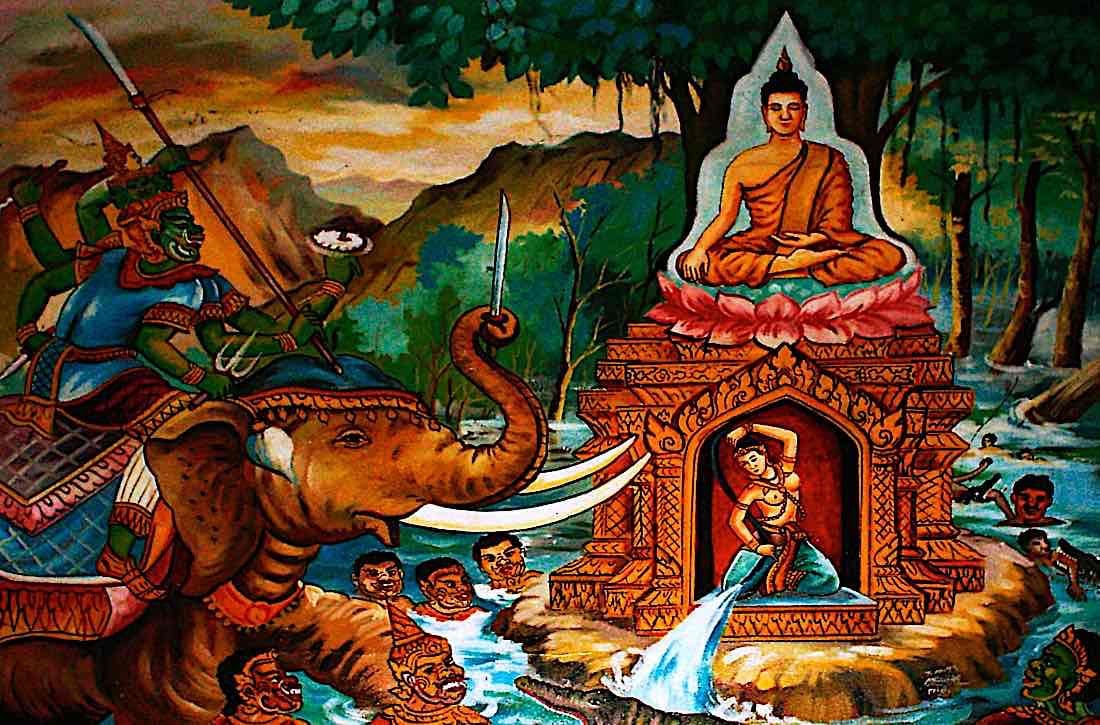
Transforming the Poisons with Vasudhara
If you’re considering walking the path laid out by Vasudhārā, you’re about to engage with a truly transformative force. Known for her bestowment of material and spiritual wealth, this enlightened deity could be your guide towards a life of abundance, prosperity, and spiritual enlightenment.
Vasudhārā’s practice isn’t a mundane wealth practice. You may originally see her as the deliverer of riches, yet her teachings pivot around generosity and charity — and She fully expects you, for the sake of your own positive merit and karma, to overcome your own greed by practicing as a Bodhisattva, with a mission to help others.

As Mother Earth, She Can be Fierce
As Mother Earth, Vasudahara is a great provider, but she can be wrathful as well. For this reason, for example, the 11th Tara, who is Vasudhara, is semi-wrathful, gold-ish red yellow . The 11th Tara specifically controls the entire assembly of 10 Earthly Protectors (See section below), and as such, she encompasses some ferocity.
How did Vasudhara show that she witnessed Buddha’s benevolence? She shook the world in six different ways. Just as Mother Earth is our wonderful motherly provider, she has a wrathful side as well. To practice Vasudhara, we undertake to likewise protect Mother Earth and all sentient beings on Her. In other words, environmental activism is another way we make offerings to Vasudhara, together with generosity.

The Power of Her Mantra
Vasudhara’s mantra, whether as her heart mantra, or as Yellow Tara Vasudhara (the 11th of 21 Taras) is profoundly effective, and results-oriented. But, it is also powerfully transformative in your life.
Vasudhārā: “Stream of gems,” a shining beacon of wealth, prosperity, and enlightenment, and a guiding light towards selfless giving and boundless loving. Are you ready to embrace her wisdom?
Her most popular mantra is:
Om Sri Vasudhara Ratna Nidhana Kashetri Svaha
The meaning of the mantra is:
Om — Praising the Body, Speach and Mind of Vasudhara
Sri — is Sanskrit for “Abundance”
Vasudhara — the Name of the Goddess which means “Endless Stream of Jewels”
Ratna — indicates she belongs to the Ratna Family — in this context she emanates from Ratnasmbhava and is also the Co-Equal Wisdom Partner of Yellow Jambhala, the God of Wealth, who also emanates from Ratnasambhava
Nidhana — means “treasure” according to Mahāprajñāpāramitāśāstra (chapter 41. Also translates as “treasury of Dharma Jewel” according to the Gaganagañjaparipṛcchā: the eighth chapter of the Mahāsaṃnipāa.
Kashetri — “to cultivate” in this context, as in to “cultivate the treasure” which can be a spiritual or material treasure.
Svaha — “well said” and “so be it” or “thus it is”
The entire mantra, translates contextually:
I prostrate and praise the Goddess of Abundance Vasudhara of the Jewel Family, who helps us cultivate material and spiritual wisdom treasures, so be it.
Short Mantra
Oṃ Vasudhārāyai Svāhā.
Vasudhara Long Dharani from Sutra
(See the full Sutra below.)
Buddha transmitted the long Dharani of Vasudhara to Sucanda (the Layman, see story in next section) to help him attain success and wealth for the benefit of the Dharma and sentient beings, and instructed Sucana and Ananda to transmit and teach the Dharani widely:
tadyathā | oṃ surūpe bhadre bhadravati aṅgale maṅgale maṅgalavati ale acale acala-bale udghātini udbhedini śasyavati dhanavati dhānyavati śrīmati prabhavati amale vimale nirmale rurume surūpe surūpavimale vimale cale arcanaste atanaste vitanaste viśvakeśi viśvaniśi aṅkure maṅkure prabhaṅkure virame vidhame ririme dhidhime dhudhume khakhame tatare tara tara tāra tāra vajre vajre vajropame ṭake ṭake ṭhake ṭhake ukke bukke ṭhake ṭharake āvartani varṣaṇi (ni)ṣ(p)ādani vajradhāra-sāgara-nirghoṣaṃ tathāgataṃ anusmara smara smara sarva-tathāgata-satyam-anusmara dharma-satyam-anusmara saṅgha-satyam-anusmara data data pūra pūra pūraya pūraya pūraṇi bhara bharaṇi amale sumaṅgale śāntamati śubhamati maṅgalabhaṇi mahāmati bhadravati prabhavati sucandramati āgacchāgaccha samayam-anusmara svāhā | avaraṇim-anusmara svāhā | prabhavam-anusmara svāhā | dīdim-anusmara svāhā | tejom-anusmara svāhā | vijayam-anusmara svāhā | hṛdayam-anusmara svāhā | sarva-sattva-vijayam-anusmara svāhā |

The Benefits of the Dharani
According to the Buddha, the benefits of the Dharani are:
O noble son, through the power of this dhāraṇī no human will ever harm you. No yakṣa will ever harm you. No rākṣasa will ever harm you. No preta will ever harm you. No piśāca will ever harm you. No bhūta will ever harm you. No kumbhāṇḍa will ever harm you. No apasmāra will ever harm you. No ostāraka will ever harm you. No kaṭapūtana will ever harm you. No deva will ever harm you. No asura will ever harm you. No demons, whether they feed on feces, urine, blood, flesh, pus, grease, marrow, snot, effluent, or breath, nor spirits who are able to possess you, will ever harm you!’
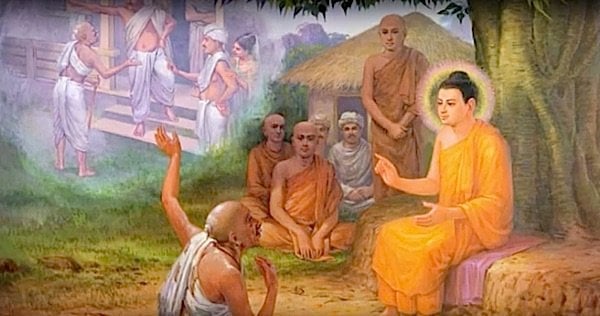
The Story of the Layman Sucandra and Vasudhārā
In the Sutra of The Vasudhara Dharani (in full below.) , we find the well-known story the humble Sucandra, who lived a life of hardship, barely supporting a large family. He was desperate to find a way to feed his family and village, and perhaps have enough to share with others.
Desperate, he went to Shakyamuni, the historical Buddha himself. He asked:
“Blessed One, although I am very poor, I have to take care of many sons, daughters and dependents. Therefore, I would like to request the Blessed One for a Dharma teaching that makes the poor wealthy and restores the ill to good health, that grants us wealth and grain and treasures and vaults of treasure, that makes us pleasant, charming, beautiful and lordly, that attracts patrons without needing to ask, and that grants jewels, gold, riches, stores of grain, and vaults of treasure, as well as gems, pearls, diamonds, lapis lazuli, conch shells, crystals, coral, gold and silver without needing to search or beg, and that renders one’s partner and dependents stable and secure.”
He followed the Buddha’s advice, and Sucandra saw an almost immediate change in his fortunes. His prosperity became so noticeable that it raised the curiosity of Ananda, a disciple and attendant of the Buddha, who then asked Shakyamuni about the source of Sucandra’s quick fortune.
Buddha taught him the Vasudhārā’s Dharani and Mantra, and advised Ananda to practice it himself and share it with others, for the benefit of many. This began a cycle of receiving and giving, spreading Vasudhārā’s abundance practice to many followers.
Buddha said:
Ānanda, therefore, you too should receive the Vasudhārā Dhāraṇī, keep it in mind, recite it, teach it, memorize it, master it, and explain it to others in detail. This will benefit many individuals. It will bring them happiness. It will bring love and compassion to the world, and it will bring benefit and happiness to hosts of beings, gods and humans alike.
This legend carries a profound message. Vasudhārā becomes a symbol of both the joy of receiving and the power in sharing, encouraging us to become conduits of her benevolence. We learn, through Sucandra’s success, the power of generosity, charity, and the sharing of good fortune. The practice of Vasudhārā’s Dharani is not simply about personal gain, it is about prospering so that others may also prosper; the true essence of the Buddhist ideal of interconnectedness and the Bodhisattva mission to help all sentient beings.
It is also about honouring Vasudhara as Mother Earth. Holding a close relationship to Mother Earth is for the benefit of all beings.

The Meaning and Symbolism of Vasudhārā: The Stream of Gems
There are three main forms of Vasudhara, although any form of Mother Earth, from Prithvi to Gaia can be considered aspects of Vasudhara, and ultimately Tara.

Two-Armed Vasudhara, Most Popular in Tibet
“Vasudhara, with one face and two hands. The right [hand] in the gesture of supreme generosity and the left holds tufts of rice and a vase, showering down various jewels. Having jewel ornaments and garments of silk. Completely surrounded by friendly beings. Seated in the vajrasana [posture].” (Konchog Lhundrub, 1497-1557. From the One Hundred Methods of Accomplishment).

Six-Armed Vasudhara, Most Popular in Nepal
“Vasudhara, yellow, with one face and six hands; in a manner happily seated at play. The first right hand is in a gesture of supreme generosity, the second ‘raining jewels,’ the third with the hand in a gesture accompanying singing. The first left holds an abundant vase, the second a sheaf of grain, the third [holds] the Prajnaparamita text; adorned with all jewel ornaments.”
(This form of Vasudhara arises from the Togpa Chungwa and the Vajravali text of Abhayakaragupta). [Source: HimalayanArt.Org]
The Third Form, is the most commonly practiced, mostly because most Vajrayana and many Mahayana Buddhists practice the 21 Taras Daily. The Third form, in the Atisha and Nyingma lineages is the 11th Tara.

Vasudhara as the 11th Tara: Tara Who Bestows Wealth
Vasudhara is the 11th of the 21 Taras (Atisha Lineage), a sparkling gold goddess (often depicted as Orange, or described as “yellow-red”) who helps us accumulate wealth for altruistic purposes. Her Names are Tara Who Bestows Wealth (Drolma Nor Terma) or Tara Who Eliminates Poverty in the Atisha lineage. Below is her Praise (from the 21 Taras), her attributes, visualization and her mantra. In the Atisha lineage she is gold orange and holds a gold or yellow vase. Similarly, in the Nyingma Lineage of 21 Taras she has a lotus flower in her left hand with the gold or yellow treasure vase on top of the Lotus.
Note: Some lineages attribute the 3rd Tara, notably in the Nyingma lineages, as Vasudhara. This is also correct. Yellow or Gold Tara emanates in multiple forms. The 11th Tara is the chief among these, as she controls the 10 Earth Guardians. In Surya Gupta, where the visualizations are completely different, She is the 12th, Tara Who brings prosperity.
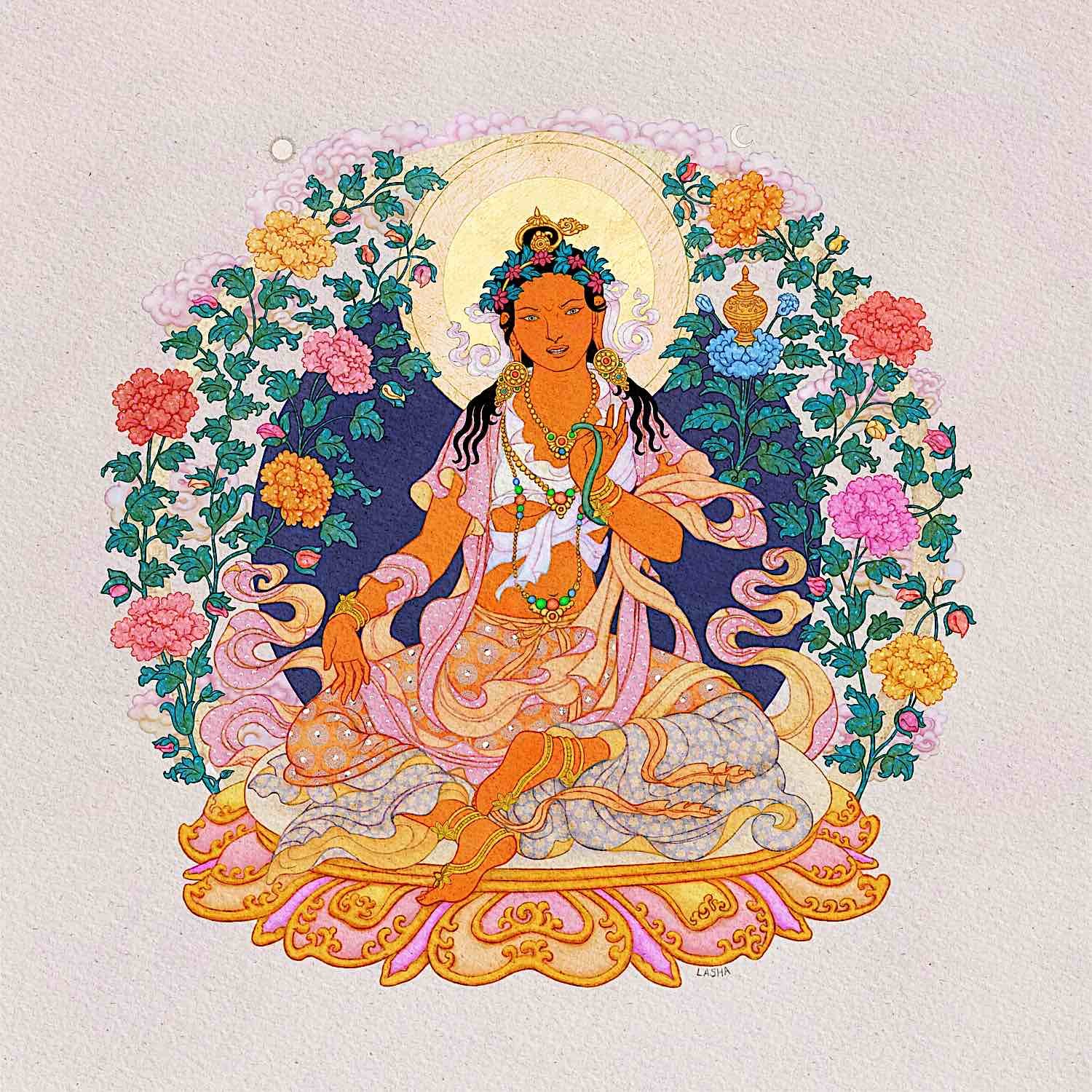
Her power over affluence, wealth is because she is Vasudhara, Goddess of the Earth, who controls the entire assembly of ten guardians and protectors, who include Jambhala / Vaisravana, Wisdom King of the North and the Enlightened God of Wealth and Good Fortune. (Dikapalas in Sanskrit)
Thus, her praise reveals her power over the ten guardians:
Homage! She able to summon
All earth-guardians’ assembly!
Shaking, frowning, with her HUM sign
Saving from every misfortune!Sanskrit:
Namah samanta bhu pala
patalakarshana kshame
chalat bhrku ti hum kara
sarvapada vimoch ani
Color: Yellow-red — sparkling gold (In Surya Gupta, however, she is black, for a more wrathful form of activity. In Surya Gupta, her name is Tara Who Summons All Beings and Dispels Misfortune.)
Seed Syllable (light emits from this syllable at her heart): Hum (Sanskrit) Hung (Tibetan)
Vase: Yellow
Nectar: affluence, auspiciousness, spiritual and material wealth, overcomes all poverty.
Activity: Attracting and affluence.
Specialty: Accumulating wealth and overcoming poverty, through the controlling activity as controller of the 10 earth-guardians.
Visualization: On the eleventh petal is Tara Who Eradicates Poverty (Ponpa Selma), red-yellow in color, like refined gold. She holds a yellow flask containing nectar whose function is to eliminate poverty.
Atisha-Lineage Mantra:
OM TARE TUTTARE TURE VASUDHARINI SVAHA
In the Nyingma lineage the mantra is:
OM TARE TUTTARE TURE MAMA VASU PUSHTIM KURU SVAHA
Note: In Tibetan Om Tare Tuttare Ture Mama Basu Pushtim Kuru Soha
In the Surya Gupta lineage, the mantra is almost the same as Atisha-lineage, although she appears as a fierce black Tara:
OM TARE TUTTARE TURE VASU DHA RE SVAHA
Lama Zopa commentary from his book The Power of Mantra Vital Practices for Transformation[1] (Available on Amazon>>): “This is the Tara you use when you make a Tara wealth vase for prosperity. When you put a statue or drawing of this Tara in a wealth vase, to eliminate either your poverty or that of others, you take strong refuge and recite this mantra in front of the vase.”

Sutra of Vasudhara Dharini: Spoken by Gautama Buddha
༄༅། །འཕགས་པ་ནོར་གྱི་རྒྱུན་ཅེས་བྱ་བའི་གཟུངས་བཞུགས་སོ། །
The Noble Vasudhārā Dhāraṇī
from the Words of the Buddha
རྒྱ་གར་སྐད་དུ། ཨཱཪྻ་བ་སུ་དྷཱ་རཱ་ནཱ་མ་དྷཱ་ར་ཎཱི།
gyagar ké du arya vasudhara nama dhara ni
In the language of India: Ārya Vasudhārā-nāma-dhāraṇī
བོད་སྐད་དུ། འཕགས་པ་ནོར་གྱི་རྒྱུན་ཅེས་བྱ་བའི་གཟུངས།
böké du pakpa nor gyi gyün chejawé zung
In the language of Tibet: Pakpa nor gyi gyün chejawé zung (‘phags pa nor gyi rgyun ces bya ba’i gzungs)
In the English language: The ‘Stream of Wealth’ Incantation
སངས་རྒྱས་དང༌བྱང་ཆུབ་སེམས་དཔའ་ཐམས་ཅད་ལ་ཕྱག་འཚལ་ལོ། །
sangye dang changchub sempa tamché la chaktsal lo
Homage to all the buddhas and bodhisattvas!
འདི་སྐད་བདག་གིས་ཐོས་པ་དུས་གཅིག་ན། བཅོམ་ལྡན་འདས་ཀཽ་ཤཱམྦཱི་ན་ཚེར་མ་ཅན་ཞེས་བྱ་བའི་ནགས་ཆེན་པོ་ན། དགེ་སློང་ལྔ་བརྒྱ་ཙམ་གྱི་དགེ་སློང་གི་དགེ་འདུན་ཆེན་པོ་དང༌། བྱང་ཆུབ་སེམས་དཔའ་སེམས་དཔའ་ཆེན་པོ་སངས་རྒྱས་ཀྱི་ཡོན་ཏན་ཐམས་ཅད་དང་ལྡན་པ་རབ་ཏུ་མང་པོ་དང་ཐབས་ཅིག་ཏུ་བཞུགས་ཏེ།
diké dak gi töpa dü chik na chomdendé kaushambi na tserma chen zhejawé nak chenpo na gelong ngabgya tsam gyi gelong gi gendün chenpo dang changchub sempa sempa chenpo sangye kyi yönten tamché dang denpa rabtu mangpo dang tab chik tu zhuk té
Thus I have heard: At one time the Blessed One was dwelling near Kauśāmbī in the great forest called Kaṇṭaka, together with a great assembly of about five hundred monks and a vast assembly of bodhisattva mahāsattvas who had all the qualities of the buddhas.
དེའི་ཚེ་ཀཽ་ཤཱམྦཱིའི་གྲོང་ཁྱེར་ཆེན་པོ་ན། ཁྱིམ་བདག་ཟླ་བ་བཟང་པོ་ཞེས་བྱ་བ། དབང་པོ་ཉེ་བར་ཞི་བ། ཡིད་ཉེ་བར་ཞི་བ། བུ་ཕོ་དང། བུ་མོ་མང་བ། བཟའ་མི་མང་པོ་དང་ལྡན་པ། དད་ཅིང་ཆེར་དད་པ་ཞིག་གནས་པ་དེ།
dé tsé kaushambi drongkhyer chenpo na khyimdak dawa zangpo zhejawa wangpo nyewar zhiwa yi nyewar zhiwa bu po dang bumo mangwa zami mangpo dang denpa dé ching cher depa zhik nepa dé
At that time there lived in the great city of Kauśāmbī a householder by the name of Sucandra whose senses were composed and whose mind was at ease. He had many faithful and devoted sons and daughters as well as dependents.
བཅོམ་ལྡན་འདས་ག་ལ་བ་དེར་སོང་སྟེ་ཕྱིན་ནས། བཅོམ་ལྡན་འདས་ཀྱི་ཞབས་ལ་མགོ་བོས་ཕྱག་འཚལ་ཏེ། ལན་འབུམ་ཕྲག་དུ་མར་བསྐོར་བ་བྱས་ནས་ཕྱོགས་གཅིག་ཏུ་འདུག་གོ །
chomdendé gala ba der song té chin né chomdendé kyi zhab lago bö chaktsal té len bumtrak dumar korwa jé né chok chik tu duk go
Sucandra approached the Blessed One, paid his respect by touching his head to the feet of the Blessed One, and circumambulated the Blessed One many hundred thousands of times.
ཕྱོགས་གཅིག་ཏུ་འདུག་ནས་ཁྱིམ་བདག་ཟླ་བ་བཟང་པོས་བཅོམ་ལྡན་འདས་ལ་འདི་སྐད་ཅེས་གསོལ་ཏོ། །
chok chik tu duk né khyimdak dawa zangpö chomdendé la diké ché sol to
Finally, he sat down to one side. While seated there, Sucandra the householder said the following to the Blessed One:
གལ་ཏེ་ཞུས་ནས་ཞུ་བ་ལུང་བསྟན་པའི་སླད་དུ། བཅོམ་ལྡན་འདས་ཀྱིས་བདག་ལ་སྐབས་ཕྱེ་ན། བཅོམ་ལྡན་འདས་དེ་བཞིན་གཤེགས་པ་དགྲ་བཅོམ་པ་ཡང་དག་པར་རྫོགས་པའི་སངས་རྒྱས་ལ་བདག་ཕྱོགས་འགའ་ཞིག་ཞུ་ལགས་སོ། །
galté zhü né zhuwa lungtenpé ledu chomdendé kyi dak la kab ché na chomdendé dezhin shekpa drachompa yangdakpar dzokpé sangye la dak chok gazhik zhu lak so
“I would like to ask the Blessed One, the Tathāgata, the Arhat, the complete and perfect Buddha a question, in case the Blessed One could afford the time to answer it.”
དེ་སྐད་ཅེས་གསོལ་བ་དང༌། བཅོམ་ལྡན་འདས་ཀྱིས་ཁྱིམ་བདག་ཟླ་བ་བཟང་པོ་ལ་འདི་སྐད་ཅེས་བཀའ་སྩལ་ཏོ། །
deké ché solwa dang chomdendé kyi khyimdak dawa zangpo la diké ché katsal to
The Blessed One then replied to Sucandra the householder as follows:
ཁྱིམ་བདག ཁྱོད་ཅི་དང་ཅི་འདོད་པ་དྲིས་ཤིག་དང༌། ཁྱོད་ཀྱིས་ཇི་ལྟར་དྲིས་པའི་དྲི་བ་ལུང་བསྟན་པས་ངས་ཁྱོད་ཀྱི་སེམས་རངས་པར་བྱའོ། །
khyimdak khyö chi dang chi döpa dri shik dang khyö kyi jitar dripé driwa lungtenpé ngé khyö kyi sem rangpar ja o
“Householder, please ask whatever you wish. I shall answer your question and so put your concerns to rest.”
དེ་སྐད་ཅེས་བཀའ་སྩལ་པ་དང༌། ཁྱིམ་བདག་ཟླ་བ་བཟང་པོས་བཅོམ་ལྡན་འདས་ལ་ལེགས་སོ་ཞེས་གསོལ་ཏེ། བཅོམ་ལྡན་འདས་ཀྱི་ལྟར་ཉན་ནས་བཅོམ་ལྡན་འདས་ལ་འདི་སྐད་ཅེས་གསོལ་ཏོ། །
deké ché katsal pa dang khyimdak dawa zangpö chomdendé la lek so zhé sol té chomdendé kyi tar nyen né chomdendé la diké ché sol to
To these words of the Blessed One Sucandra the householder responded, “Very well, Blessed One,” and asked the Blessed One the following:
བཅོམ་ལྡན་འདས། རིགས་ཀྱི་བུའམ། རིགས་ཀྱི་བུ་མོ་དབུལ་པོར་གྱུར་པ་ལས་ཇི་ལྟར་དབུལ་བ་མ་མཆིས་པར་འགྱུར་ཞིང༌། བྲོ་ནད་ཀྱིས་ཐེབས་ན་ཡང་བྲོ་ནད་མ་མཆིས་པར་འགྱུར་པ་ལགས།
chomdendé rik kyi bu am rik kyi bumo ulpor gyurpa lé jitar ulwa machipar gyur zhing dro né kyi teb na yang dro né machipar gyurpa lak
“Blessed One, how can a son or daughter of noble family who suffers from poverty free themselves from their poverty? Likewise, if they suffer from disease, how can they free themselves from their disease?”
དེ་ནས་བཅོམ་ལྡན་འདས་ཀྱིས་མཁྱེན་བཞིན་དུ་ཁྱིམ་བདག་ཟླ་བ་བཟང་པོ་ལ་འདི་སྐད་ཅེས་བཀའ་སྩལ་ཏོ། །
dené chomdendé kyi khyen zhindu khyimdak dawa zangpo la diké ché katsal to
The Blessed One then understood, and he said to Sucandra the householder:
ཁྱིམ་བདག ཁྱོད་ཅིའི་ཕྱིར་དབུལ་པོའི་དོན་དུ་འདྲི། དེ་སྐད་ཅེས་བཀའ་སྩལ་པ་དང༌།
khyimdak khyö chi chir ulpö döndu dri deké ché katsal pa dang
“Householder, why do you ask me about poverty?”
བཅོམ་ལྡན་འདས་ལ་ཁྱིམ་བདག་ཟླ་བ་བཟང་པོས་འདི་སྐད་ཅེས་གསོལ་ཏོ། །
chomdendé la khyimdak dawa zangpö diké ché sol to
Sucandra the householder replied to the Blessed One:
བཅོམ་ལྡན་འདས། བདག་ནི་དབུལ་བ་མང་བ་དང༌། གསོ་བ་མང་བ་དང༌། བུ་ཕོ་དང་བུ་མོ་མང་བ། བཟའ་མི་མང་པོ་དང་ལྡན་པ་ལགས་ཏེ། དེའི་སླད་དུ། གང་གིས་སེམས་ཅན་དབུལ་པོ་རྣམས་ཀྱི་དབུལ་བ་མ་མཆིས་པར་འགྱུར་བ་དང༌། བྲོ་ནད་ཀྱིས་ཐེབས་པ་རྣམས་བྲོ་ནད་མ་མཆིས་པར་འགྱུར་བ་དང༌། ནོར་དང༌། འབྲུ་དང༌། མཛོད་དང༌། བང་མཛོད་མང་པོ་དང་ལྡན་པར་འགྱུར་བ་དང༌། སྡུག་པ་དང༌། ཡིད་དུ་མཆིས་པ་དང༌། མཐོང་ན་ཡིད་དུ་འཐད་པ་དང༌། དབང་ཕྱུག་ཏུ་འགྱུར་བ་དང༌། སྦྱིན་བདག་མཛོད་པས་མི་འཚལ་ཞིང༌། དབྱིག་དང༌། གསེར་དང༌། ནོར་དང༌། འབྲུའི་མཛོད་དང༌། བང་མཛོད་རྣམས་དང༌། ནོར་བུ་དང༌། མུ་ཏིག་དང༌། རྡོ་རྗེ་དང༌། བཻ་ཌཱུཪྻ་དང༌། དུང་དང༌། མན་ཤེལ་དང༌། བྱི་རུ་དང༌། ས་ལེ་སྦྲམ་དང༌། དབུལ་བས་མ་འཚལ་ཅིང་འབྱོར་བར་འགྱུར་བ་དང༌། ཁྱིམ་གྱི་བུ་སྨད་དང༌། བཟའ་མི་རྣམས་བརྟན་པར་འགྱུར་བའི་ཆོས་ཀྱི་རྣམ་གྲངས་དེ་བཅོམ་ལྡན་འདས་ཀྱིས་ལེགས་པར་བཤད་དུ་གསོལ།
chomdendé dak ni ulwa mangwa dang sowa mangwa dang bu po dang bumo mangwa zami mangpo dang denpa lak té dé ledu gang gi semchen ulpo nam kyi ulwa machipar gyurwa dang dro né kyi tebpa nam dro né machipar gyurwa dang nor dang dru dang dzö dang bangdzö mangpo dang denpar gyurwa dang dukpa dang yi duchi pa dang tong na yi du tepa dang wangchuk tu gyurwa dang jindak dzöpé mi tsal zhing yik dang ser dang nor dang drü dzö dang bangdzö nam dang norbu dang mutik dang dorjé dang baidurya dang dung dang men shel dang jiru dang salé dram dang ulwé ma tsal ching jorwar gyurwa dang khyim gyi bu mé dang zami nam tenpar gyurwé chö kyi namdrang dé chomdendé kyi lekpar shé du sol
“Blessed One, although I am very poor, I have to take care of many sons, daughters and dependents. Therefore, I would like to request the Blessed One for a Dharma teaching that makes the poor wealthy and restores the ill to good health, that grants us wealth and grain and treasures and vaults of treasure, that makes us pleasant, charming, beautiful and lordly, that attracts patrons without needing to ask, and that grants jewels, gold, riches, stores of grain, and vaults of treasure, as well as gems, pearls, diamonds, lapis lazuli, conch shells, crystals, coral, gold and silver without needing to search or beg, and that renders one’s partner and dependents stable and secure.”
དེ་སྐད་ཅེས་གསོལ་བ་དང༌། བཅོམ་ལྡན་འདས་ཀྱིས་ཁྱིམ་བདག་ཟླ་བ་བཟང་པོ་ལ་འདི་སྐད་ཅེས་བཀའ་སྩལ་ཏོ། །
deké ché solwa dang chomdendé kyi khyimdak dawa zangpo la diké ché katsal to
This being said, the Blessed One replied then to the householder Sucandra:
ཁྱིམ་བདག འདས་པའི་དུས་བསྐལ་བ་གྲངས་མེད་པ་འདས་པར་གྱུར་པ་དེའི་ཚེ་དེའི་དུས་ན། བཅོམ་ལྡན་འདས་དེ་བཞིན་གཤེགས་པ་དགྲ་བཅོམ་པ་ཡང་དག་པར་རྫོགས་པའི་སངས་རྒྱས་རིག་པ་དང་ཞབས་སུ་ལྡན་པ། བདེ་བར་གཤེགས་པ། འཇིག་རྟེན་མཁྱེན་པ། སྐྱེས་བུ་འདུལ་བའི་ཁ་ལོ་སྒྱུར་བ། བླ་ན་མེད་པ། ལྷ་དང་མི་རྣམས་ཀྱི་སྟོན་པ། སངས་རྒྱས་བཅོམ་ལྡན་འདས་རྡོ་རྗེ་འཆང་རྒྱ་མཚོའི་དབྱངས་ཞེས་བྱ་བ་འཇིག་རྟེན་དུ་བྱུང་སྟེ།
khyimdak depé dü kalwa drangmepa depar gyurpa dé tsé dé dü na chomdendé dezhin shekpa drachompa yangdakpar dzokpé sangye rigpa dang zhab su denpa dewar shekpa jikten khyenpa kyebu dulwé khalo gyurwa lanamepa lha dang mi nam kyi tönpa sangye chomdendé dorjé chang gyatsö yang zhejawa jikten du jung té
“Householder, once upon a time, incalculable eons ago, the Blessed One, the Tathāgata, the Arhat, the complete and perfect Buddha, dwelled in the world with perfect knowledge and with virtuous conduct. This sugata, the knower of worlds, the leader for those to be tamed, the unsurpassed teacher of gods and men, the Blessed Buddha, was named Vajradhara-sāgaranirghoṣa.
རིགས་ཀྱི་བུ། ངས་དེ་བཞིན་གཤེགས་པ་དེ་ལས་ནོར་གྱི་རྒྱུན་ཅེས་བྱ་བའི་གཟུངས་འདི་ཐོས་ཏེ། བཟུང་ཞིང་བཅངས་བཀླགས། ཀུན་ཆུབ་པར་བྱས། རྗེས་སུ་ཡི་རང་བར་བྱས་ཤིང༌། གཞན་དག་ལ་ཡང་རྒྱ་ཆེར་ཡང་དག་པར་རབ་ཏུ་བསྟན་ཏེ།
rik kyi bu ngé dezhin shekpa dé lé nor gyi gyün chejawé zung di tö té zung zhing chang lak kün chubpar jé jesu yirangwar jé shing zhendak la yang gyacher yangdakpar rabtu ten té
O noble son, it is from this tathāgata that I heard and retained the Vasudhārā Dhāraṇī. I kept it, recited it, comprehended it, rejoiced in it, and taught it extensively to others.
རིགས་ཀྱི་བུ། ད་ཡང་ངས་དེ་བཤད་པར་བྱའོ། །
rik kyi bu da yang ngé dé shepar ja o
O noble son, I shall now share it with you.
རིགས་ཀྱི་བུ། གཟུངས་འདིའི་མཐུས་མི་རྣམས་རྣམ་པར་མཐོ་འཚམ་པར་མི་བྱེད་དོ། །མི་མ་ཡིན་པ་རྣམས་རྣམ་པར་མཐོ་འཚམ་པར་མི་བྱེད་དོ། །གནོད་སྦྱིན་རྣམས་རྣམ་པར་མཐོ་འཚམ་པར་མི་བྱེད་དོ། །སྲིན་པོ་རྣམས་རྣམ་པར་མཐོ་འཚམ་པར་མི་བྱེད་དོ། །ཡི་དྭགས་རྣམས་རྣམ་པར་མཐོ་འཚམ་པར་མི་བྱེད་དོ། །ཤ་ཟ་རྣམས་རྣམ་པར་མཐོ་འཚམ་པར་མི་བྱེད་དོ། །འབྱུང་པོ་རྣམས་རྣམ་པར་མཐོ་འཚམ་པར་མི་བྱེད་དོ། །གྲུལ་བུམ་རྣམས་རྣམ་པར་མཐོ་འཚམ་པར་མི་བྱེད་དོ། །བརྗེད་བྱེད་རྣམས་རྣམ་པར་མཐོ་འཚམ་པར་མི་བྱེད་དོ། །གནོན་པོ་རྣམས་རྣམ་པར་མཐོ་འཚམ་པར་མི་བྱེད་དོ། །ལུས་སྲུལ་པོ་རྣམས་རྣམ་པར་མཐོ་འཚམ་པར་མི་བྱེད་དོ། །ལྷ་རྣམས་རྣམ་པར་མཐོ་འཚམ་པར་མི་བྱེད་དོ། །ལྷ་མ་ཡིན་རྣམས་རྣམ་པར་མཐོ་འཚམ་པར་མི་བྱེད་དོ། །ཟས་སུ་མི་གཙང་བ་ཟ་བ་རྣམས་དང༌། ཟས་སུ་གཅིན་འཐུང་བ་རྣམས་དང་། ཟས་སུ་ཁྲག་འཐུང་བ་རྣམས་དང༌། ཟས་སུ་ཤ་ཟ་བ་རྣམས་དང༌། ཟས་སུ་རྣག་འཐུང་བ་རྣམས་དང༌། ཟས་སུ་ཞག་ཟ་བ་རྣམས་དང༌། ཟས་སུ་རྐང་ཟ་བ་རྣམས་དང༌། ཟས་སུ་ངར་སྣབས་ཟ་བ་རྣམས་དང༌། ཟས་སུ་གཏོར་ཁུང་ནས་འབབ་པ་འཐུང་བ་རྣམས་དང༌། ཟས་སུ་དབུགས་རྔུབ་པ་རྣམས་དང༌། འབྱུང་བ་ཟ་བའི་བར་རྣམས་རྣམ་པར་འཚེ་བར་མི་འགྱུར་རོ། །
rik kyi bu zung di tü mi nam nampar to tsampar mi jé do mi mayinpa nam nampar to tsampar mi jé do nöjin nam nampar to tsampar mi jé do sinpo nam nampar to tsampar mi jé do yidak nam nampar to tsampar mi jé do shaza nam nampar to tsampar mi jé do jungpo nam nampar to tsampar mi jé do drulbum nam nampar to tsampar mi jé do jé jé nam nampar to tsampar mi jé do nönpo nam nampar to tsampar mi jé do lü sulpo nam nampar to tsampar mi jé do lha nam nampar to tsampar mi jé do lha mayin nam nampar to tsampar mi jé do zé su mi tsangwa zawa nam dang zé su chin tungwa nam dang zé su traktung ba nam dang zé su shaza ba nam dang zé su nak tungwa nam dang zé su zhak zawa nam dang zé su kang zawa nam dang zé su ngarnab zawa nam dang zé su tor khung né babpa tungwa nam dang zé su uk ngubpa nam dang jungwa zawé bar nam nampar tsewar mingyur ro
O noble son, through the power of this dhāraṇī no human will ever harm you. No yakṣa will ever harm you. No rākṣasa will ever harm you. No preta will ever harm you. No piśāca will ever harm you. No bhūta will ever harm you. No kumbhāṇḍa will ever harm you. No apasmāra will ever harm you. No ostāraka will ever harm you. No kaṭapūtana will ever harm you. No deva will ever harm you. No asura will ever harm you. No demons, whether they feed on feces, urine, blood, flesh, pus, grease, marrow, snot, effluent, or breath, nor spirits who are able to possess you, will ever harm you!
རིགས་ཀྱི་བུ། ནོར་གྱི་རྒྱུན་གྱི་གཟུངས་འདི་རིགས་ཀྱི་བུའམ། རིགས་ཀྱི་བུ་མོ་གང་གི་ཁྱིམ་ན་ཡོད་དམ། སྙིང་ལ་ཡོད་དམ། ལག་ན་ཡོད་དམ། གླེགས་བམ་དུ་ཆུད་དམ། ཐོས་པར་གྱུར་ཏམ། ཀུན་ཆུབ་པར་བྱས་སམ། བཀླགས་སམ། བཟུང་ངམ། རྗེས་སུ་ཡི་རང་བར་བྱས་སམ། གཞན་དག་ལ་རྒྱ་ཆེར་རབ་ཏུ་བསྟན་པའི་རིགས་ཀྱི་བུའམ། རིགས་ཀྱི་བུ་མོ་དེ་ལ་ཡུན་རིང་པོའི་དོན་དང༌། ཕན་པ་དང༌། དགེ་བ་དང༌། གྲུབ་པ་དང༌། བདེ་བ་དང༌། ལོ་ལེགས་བར་འགྱུར་རོ། །
rik kyi bu nor gyi gyün gyi zung di rik kyi bu am rik kyi bumo gang gi khyim na yö dam nying la yö dam lak na yö dam lekbam du chü dam töpar gyur tam kün chubpar jé sam lak sam zung ngam jesu yirangwar jé sam zhendak la gyacher rabtu tenpé rik kyi bu am rik kyi bumo dé la yünringpö dön dang penpa dang gewa dang drubpa dang dewa dang lo lekwar gyur ro
O noble son, the son or daughter of noble family who takes the Vasudhārā Dhāraṇī and places it in their home, takes it to heart, holds it in their hands, renders it in text, listens to it, comprehends it, reads it, memorizes it, rejoices in it, and extensively teaches it to others, will enjoy lasting benefits, welfare, goodness, advantages, pleasures, and good harvests.
སུ་ཞིག་དེ་བཞིན་གཤེགས་པ་རྣམས་ལ་མཆོད་པ་བྱས་ཏེ། ནོར་གྱི་རྒྱུན་གྱི་གཟུངས་འདི་ནམ་ཕྱེད་ན་ལན་གཉིས་སམ། ལན་གསུམ་མམ། ལན་བཞི་བཏོན་ན། དེའི་ལྷ་ཡིད་རངས་ཏེ་དེ་བཞིན་གཤེགས་པའི་བསྟན་པ་ལ་དགའ་བ་དང༌། ཆོས་གདགས་པ་བྱས་པས་དགའ་བ་དང༌། དགེ་འདུན་གདགས་པ་བྱས་པས་དགའ་བ་དང༌། ཆོས་སྨྲ་བ་ལ་དགའ་བ་དང༌། ལྷག་པའི་བསམ་པས་བདག་ཉིད་འོངས་ཏེ། འབྲུའི་ཆར་འབེབས་སོ། །
su zhik dezhin shekpa nam la chöpa jé té nor gyi gyün gyi zung di nam ché na len nyi sam len sum mam len zhi tön na dé lha yi rang té dezhin shekpé tenpa la gawa dang chö dakpa jepé gawa dang gendün dakpa jepé gawa dang chöma bala gawa dang lhakpé sampé daknyi ong té drü charbeb so
Whoever worships the tathāgatas and then at midnight recites the Vasudhārā Dhāraṇī two, three or four times will cause the deities to rejoice. They will bring delight through the teachings of the Tathāgata, and through contributing to the promulgation of the Dharma and development of the Saṅgha, and bring delight to those who teach the Dharma. Noble thoughts will come to them and a rain of grains will shower down upon them.
ན་མོ་བཛྲ་དྷ་ར་སཱ་ག་ར་ནིརྒྷོ་ཥཱ་ཡ། ཏ་ཐཱ་ག་ཏཱ་ཡ།
namo benza dhara sagara nirghoshaya tathagataya |
namo vajradhara-sāgara-nirghoṣāya tathāgatāya |
ཏདྱ་ཐཱ། ཨོཾ་སུ་རཱུ་བེ། བྷ་དྲེ། བྷ་དྲ་བ་ཏི། ཨཾ་ག་ལེ། མཾ་ག་ལེ། མཾ་ག་ལ་བ་ཏི། ཨ་ལེ། ཨ་ཙ་ལེ། ཨ་ཙ་ལ་བ་ལེ། ཨུདྒྷ་ཏི་ནི། ཨུད་བྷེ་དི་ནི། ཤ་སྱ་བ་ཏི། དྷ་ན་བ་ཏི། དྷཱ་ནྱ་བ་ཏི། ཤྲཱི་མ་ཏི། པྲ་བྷ་བ་ཏི། ཨ་མ་ལེ། བི་མ་ལེ། ནི་རྨ་ལེ། རུ་རུ་མེ། སུ་རཱུ་པེ། སུ་རཱུ་པ་བི་མ་ལེ། བི་མ་ལེ། ཙ་ལེ། ཨ་རྩ་ན་སྟེ། ཨ་ཏ་ན་སྟེ། བི་ཏ་ན་སྟེ། བི་ཤྭ་ཀེ་ཤི། བི་ཤྭ་ནི་ཤི། ཨཾ་ཀུ་རེ། མཾ་ཀུ་རེ། པྲ་བཾ་ཀུ་རེ། བི་ར་མེ། བི་དྷ་མེ། རི་རི་མེ། དི་དི་མེ། དུ་དུ་མེ། ཁ་ཁ་མེ། ཏ་ཏ་རེ། ཏ་ར་ཏ་ར། ཏཱ་ར་ཏཱ་ར། བཛྲེ་བཛྲེ་བཛྲོ་པ་མེ། ཊ་ཀེ་ཊ་ཀེ། ཋ་ཀེ་ཋ་ཀེ། ཨུཀྐེ་བུཀྐེ། ཐ་ཀེ་ཐ་ར་ཀེ། ཨ་བརྟ་ནི། བ་ར་ཤ་ནི། ཥ་ད་ནི་བཛྲ་དྷ་ར་སཱ་ག་ར་ནིརྒྷོ་ཥཱན། ཏ་ཐཱ་ག་ཏ་མ་ནུ་སྨ་ར། སྨ་ར་སྨ་ར། སརྦ་ཏ་ཐཱ་ག་ཏ་ས་ཏྱ་མ་ནུ་སྨ་ར། དྷརྨ་སཏྱ་མ་ནུ་སྨ་ར། སཾ་གྷ་ས་ཏྱ་མ་ནུ་སྨ་ར། ད་ཏ་ད་ཏ། པཱུ་ར་པཱུ་ར། པཱུ་ར་ཡ་པཱུ་ར་ཡ། པཱུ་ར་ཎི། བྷ་ར་བྷ་ར་ཎི། ཨ་མ་ལེ། སུ་མཾ་ག་ལེ། ཤཱནྟ་མ་ཏི། ཤུ་བྷ་མ་ཏི། མཾ་ག་ལ་བྷ་ནི། མ་ཧཱ་མ་ཏི། བྷ་དྲ་བ་ཏི། པྲ་བྷཱ་བ་ཏི། སུ་ཙནྡྲ་མ་ཏི། ཨཱ་གཙྪ། ཨཱ་གཙྪ། ས་མ་ཡ་མ་ནུ་སྨ་ར་སྭཱཧཱ། ཨཱ་བ་ར་ཎི་མ་ནུ་སྨ་ར་སྭཱཧཱ། པྲ་བྷ་བ་མ་ནུ་སྨ་ར་སྭཱཧཱ། དཱི་དི་མ་ནུ་སྨ་ར་སྭཱཧཱ། ཏེ་ཛོ་མ་ནུ་སྨ་ར་སྭཱཧཱ། བི་ཛ་ཡ་མ་ནུ་སྨ་ར་སྭཱཧཱ། ཧྲྀ་ད་ཡ་མ་ནུ་སྨ་ར་སྭཱཧཱ། སརྦ་སཏྭ་བི་ན་ཡ་མ་ནུ་སྨ་ར་སྭཱཧཱ།
teyata | om surubé bhadré bhadra bati amgalé mamga é mamgala bati alé atsalé atsala balé udghatini udbhédini shasya bati dhana bati dhanya bati shri mati trabha bati amalé bimalé nimalé rurumé surupé surupa bimalé bimalé tsalé atsanasté atanasté bitanaté bishokeshi bishonishi amkuré mamkuré trabamkuré biramé bidhamé ririmé didimé dudumé khakhamé tataré tara tara tara tara badzré badzré badzropamé také také thaké thaké ukké bukké thaké tharaké abartani barashani shadani benzadhara sagara nirghosham tathagatam anusmara smara smara sarva tathagata satyam anusmara dharma satyam anusmara sangha satyam anusmara data data pura pura puraya puraya purani bhara bharani amalé sumamgalé shanta mati shubha mati mamgala bhani maha mati bhadra bati trabha bati sutsandra mati agatsa gatsa samayam anusmara soha | awaranim anusmara soha | trabhawam anusmara soha | didim anusmara soha tédzom anusmara soha | bidzayam anusmara soha | hridayam anusmara soha sarva sato binayam anusmara soha |
tadyathā | oṃ surūpe bhadre bhadravati aṅgale maṅgale maṅgalavati ale acale acala-bale udghātini udbhedini śasyavati dhanavati dhānyavati śrīmati prabhavati amale vimale nirmale rurume surūpe surūpavimale vimale cale arcanaste atanaste vitanaste viśvakeśi viśvaniśi aṅkure maṅkure prabhaṅkure virame vidhame ririme dhidhime dhudhume khakhame tatare tara tara tāra tāra vajre vajre vajropame ṭake ṭake ṭhake ṭhake ukke bukke ṭhake ṭharake āvartani varṣaṇi (ni)ṣ(p)ādani vajradhāra-sāgara-nirghoṣaṃ tathāgataṃ anusmara smara smara sarva-tathāgata-satyam-anusmara dharma-satyam-anusmara saṅgha-satyam-anusmara data data pūra pūra pūraya pūraya pūraṇi bhara bharaṇi amale sumaṅgale śāntamati śubhamati maṅgalabhaṇi mahāmati bhadravati prabhavati sucandramati āgacchāgaccha samayam-anusmara svāhā | avaraṇim-anusmara svāhā | prabhavam-anusmara svāhā | dīdim-anusmara svāhā | tejom-anusmara svāhā | vijayam-anusmara svāhā | hṛdayam-anusmara svāhā | sarva-sattva-vijayam-anusmara svāhā |
ཨོཾ་བཱ་སུ་དྷཱ་རེ་སྭཱཧཱ། ཨོཾ་བཱ་སུ་ཤྲཱི་ཡེ་སྭཱཧཱ། ཨོཾ་ཤྰྲི་བ་སུ་སྭཱཧཱ། ཨོཾ་བ་སུ་སྭཱཧཱ།
om basudharé soha | om basushriyé soha | om shribasu soha | om basu soha |
oṃ vasudhāre svāhā | oṃ vasuśriye svāhā | oṃ śrīvasu svāhā | oṃ vasu svāhā ||1
རིགས་ཀྱི་བུ། འདི་ནི་ནོར་གྱི་རྒྱུན་ཅེས་བྱ་བའི་གཟུངས་ཏེ། གཟུངས་སྔགས་འདིའི་མཐུས་མུ་གེ་དང༌། ནད་དང༌། འཆི་ངས་འབྱུང་བར་མི་འགྱུར་རོ། །
rik kyi bu di ni nor gyi gyün chejawé zung té zung ngak di tü mugé dang né dang chi ngé jungwar mingyur ro
Noble son, this is the Vasudhārā Dhāraṇī. Famine, diseases, and untimely death will be averted through the power of this dhāraṇī-mantra.
རིགས་ཀྱི་བུ། སུ་ཞིག་དེ་བཞིན་གཤེགས་པ་དགྲ་བཅོམ་པ་ཡང་དག་པར་རྫོགས་པའི་སངས་རྒྱས་རྣམས་ལ་མཆོད་པ་བྱས་ཏེ། ནོར་གྱི་རྒྱུན་གྱི་གཟུངས་ཀྱི་གསང་སྔགས་ཀྱི་ཚིག་འདི་དག་ནུབ་གཅིག་བཏོན་ན། དེ་ནས་དངོས་གྲུབ་ཏུ་འགྱུར་རོ། །
rik kyi bu su zhik dezhin shekpa drachompa yangdakpar dzokpé sangye nam la chöpa jé té nor gyi gyün gyi zung kyi sang ngak kyi tsik didak nub chik tön na dené ngödrub tu gyur ro
Noble son, whoever worships the tathāgatas, the arhats, the complete and perfect buddhas, and recites the words of this secret mantra, the Vasudhārā Dhāraṇī, while facing the west will reach accomplishment.
རྒྱས་པའི་དོན་དུ་བདག་གི་ཁྱིམ་མམ། གཞན་གྱི་ཁྱིམ་མམ། གནས་གཙང་མའི་བང་མཛོད་དམ། གནས་གང་ཡང་རུང་བར་དེ་བཞིན་གཤེགས་པ་སྤྱན་རས་གཟིགས་དབང་ཕྱུག་དང༌། སངས་རྒྱས་དང༌། བྱང་ཆུབ་སེམས་དཔའ་ཐམས་ཅད་དང༌། གསང་སྔགས་ཀྱི་ལྷའི་ཕྱིར་ཙནྡན་གྱིས་དཀྱིལ་འཁོར་གྲུ་བཞིར་བྱས་ཏེ། ནུབ་གཅིག་བཏོན་ན། རིགས་ཀྱི་བུ། དེའི་ཁྱིམ་ནོར་དང༌། འབྲུ་དང༌། གསེར་དང༌། དངུལ་དང༌། ཡོ་བྱད་ཐམས་ཅད་ཀྱི་རྒྱུན་མི་ཆེན་པོའི་ཚད་ཙམ་གྱིས་གང་བར་འགྱུར་རོ། །འཇིགས་པ་དང་གནོད་པ་ཐམས་ཅད་ཀྱང་མེད་པར་འགྱུར་རོ། །
gyepé döndu dak gi khyim mam zhen gyi khyim mam netsangmé bangdzö dam né gangyang rungwar dezhin shekpa chenrezik wangchuk dang sangye dang changchub sempa tamché dang sang ngak kyi lhé chir tsenden gyi kyilkhor dru zhir jé té nub chik tön na rik kyi bu dé khyim nor dang dru dang ser dang ngul dang yojé tamché kyi gyün mi chenpö tsé tsam gyi gangwar gyur ro jikpa dang nöpa tamché kyang mepar gyur ro
To explain this in more detail: Arrange a maṇḍala in a suitable place—such as your own house, another person’s house, a clean place, or a storehouse—using sandalwood for the Tathāgata, Lord Avalokiteśvara, and all the buddhas and bodhisattvas and secret mantra deities, and recite the dhāraṇī while facing the west. Noble son, the person’s house will soon be completely filled with a stream of jewels, grain, gold, silver, and all necessities, and all danger and harm will be brought to an end.
རིགས་ཀྱི་བུ། དེའི་ཕྱིར་ཁྱོད་རབ་ཏུ་བསྒྲིམས་ལ་ནོར་གྱི་རྒྱུན་གྱི་གཟུངས་འདི་ཟུངས་ཤིག །ཆོངས་ཤིག །ལྷོགས་ཤིག །སྟོན་ཅིག །གཞན་དག་ལ་ཡང་རྒྱ་ཆེར་ཡང་དག་པར་རབ་ཏུ་སྟོན་ཅིག་དང༌། དེས་ཁྱོད་ཀྱི་ཡུན་རིང་པོའི་དོན་དང༌། ཕན་པ་དང༌། བདེ་བར་འགྱུར་རོ། །
rik kyi bu dé chir khyö rabtu drim la nor gyi gyün gyi zung di zung shik chong shik lhok shik tön chik zhendak la yang gyacher yangdakpar rabtu tön chik dang dé khyö kyi yünringpö dön dang penpa dang dewar gyur ro
Noble son, therefore, hold the Vasudhārā Dhāraṇī dear. Retain it! Memorize it! Recite it! Teach it! Explain it to others as well! This will lead to your lasting benefit, welfare and happiness.”
བཅོམ་ལྡན་འདས། ལེགས་སོ་ཞེས་གསོལ་ཏེ།
chomdendé lek so zhé sol té
“Very well, Blessed One!” said the householder Sucandra upon receiving the Vasudhārā Dhāraṇī from the Blessed One.
ཁྱིམ་བདག་ཟླ་བ་བཟང་པོས་བཅོམ་ལྡན་འདས་ལས་ནོར་གྱི་རྒྱུན་གྱི་གཟུངས་འདི་ཐོས་ནས་ཚིམ་ཞིང་དགའ་ལ་མགུ་ཞིང་ཡིད་རངས་ཏེ། རབ་ཏུ་དགའ་ནས་དགའ་བ་དང༌། ཡིད་བདེ་བ་སྐྱེས་ཏེ། བཅོམ་ལྡན་འདས་ཀྱི་ཞབས་ལ་མགོ་བོས་ཕྱག་འཚལ་ནས་བཅོམ་ལྡན་འདས་ལ་འདི་སྐད་ཅེས་གསོལ་ཏོ། །
khyimdak dawa zangpö chomdendé lé nor gyi gyün gyi zung di tö né tsim zhing ga la gu zhing yi rang té rabtu ga né gawa dang yi dewa kyé té chomdendé kyi zhab lago bö chaktsal né chomdendé la diké ché sol to
Pleased, glad, joyful, delighted, happy, satisfied and joyous was Sucandra as he paid homage by touching the feet of the Blessed One to his head. He then said to the Blessed One:
བཅོམ་ལྡན་འདས། བདག་གིས་ནོར་གྱི་རྒྱུན་ཅེས་བགྱི་བ་བླངས་ལགས། གཟུངས་སུ་ཟིན་ལགས། བཟུང་ལགས། བཀླགས་ལགས། ཀུན་ཆུབ་པར་བགྱིས་ལགས། རྗེས་སུ་ཡི་རང་བར་བགྱིས་ལགས་སོ། །གཞན་དག་ལ་ཡང་རྒྱ་ཆེར་ཡང་དག་པར་རབ་ཏུ་བསྟན་པར་བགྱིས་ལགས་སོ། །
chomdendé dak gi nor gyi gyün ché gyiwa lang lak zung su zin lak zung lak lak lak kün chubpar gyi lak jesu yirangwar gyi lak so zhendak la yang gyacher yangdakpar rabtu tenpar gyi lak so
“Blessed One, now that I have received the ritual for Vasudhārā, I will keep this dhāraṇī in mind; I will memorize it; I will recite it; I will master it; I will delight in it; and I will explain it in detail to others as well!”
དེའི་སྐད་ཅིག་ཙམ་ལ་ཁྱིམ་བདག་ཟླ་བ་བཟང་པོའི་བང་མཛོད་རྣམས་ཡོངས་སུ་གང་བར་གྱུར་ཏོ། །
dé kechik tsam la khyimdak dawa zangpö bangdzö nam yongsu gangwar gyur to
At that very moment, Sucandra the householder’s storehouses became completely full.
དེ་ནས་ཁྱིམ་བདག་ཟླ་བ་བཟང་པོས་བཅོམ་ལྡན་འདས་ལ་ལན་འབུམ་ཕྲག་དུ་མར་བསྐོར་བ་བྱས་ཏེ། བཅོམ་ལྡན་འདས་ཀྱི་ཞབས་ལ་ཕྱག་འཚལ་ནས། བཅོམ་ལྡན་འདས་ཀྱི་ཐད་ནས་སོང་ངོ༌། །
dené khyimdak dawa zangpö chomdendé la len bumtrak dumar korwa jé té chomdendé kyi zhab la chaktsal né chomdendé kyi té né song ngo
Sucandra the householder circumambulated the Blessed One many hundreds of thousands of times, and after touching his head to the feet of Blessed One, he left his presence.
དེ་ནས་བཅོམ་ལྡན་འདས་ཀྱིས་ཚེ་དང་ལྡན་པ་ཀུན་དགའ་བོ་ལ་བཀའ་སྩལ་པ།
dené chomdendé kyi tsé dang denpa küngawo la katsal pa
The Blessed One then spoke to venerable Ānanda:
ཀུན་དགའ་བོ། ཁྱོད་སོང་ལ་ཁྱིམ་བདག་ཟླ་བ་བཟང་པོའི་ཁྱིམ་ནོར་དང༌། འབྲུས་ཡོངས་སུ་གང་བ་ཕུན་སུམ་ཚོགས་པ་དང༌། མཛོད་ཆེན་པོ་དང༌། བང་མཛོད་ཡོངས་སུ་གང་བ་རྣམས་ལ་ལྟོས།
küngawo khyö song la khyimdak dawa zangpö khyim nor dang drü yongsu gangwa pünsum tsokpa dang dzö chenpo dang bangdzö yongsu gangwa nam la tö
“Ānanda, go to Sucandra the householder, the one whose home is abundantly filled with all kinds of riches and grains and whose massive treasury and storehouses are replete with all one could require.”
དེ་ནས་ཚེ་དང་ལྡན་པ་ཀུན་དགའ་བོས་བཅོམ་ལྡན་འདས་ཀྱི་ལྟར་མཉན་ནས་ཀཽ་ཤཱམྦཱིའི་གྲོང་ཁྱེར་ཆེན་པོ་ག་ལ་བ་དང༌། ཁྱིམ་བདག་ཟླ་བ་བཟང་པོའི་ཁྱིམ་ག་ལ་བ་དེར་སོང་སྟེ་ཕྱིན་ནས་ནང་དུ་ཞུགས་པ་དང༌། ནོར་དང༌། འབྲུས་ཡོངས་སུ་གང་བ་ཕུན་སུམ་ཚོགས་པ་དང༌། རིན་པོ་ཆེ་ཕུན་སུམ་ཚོགས་པ་དང༌། ཡོ་བྱད་ཐམས་ཅད་ཀྱི་མཛོད་པ་ཆེན་པོ་དང༌། བང་མཛོད་རྣམས་ཀྱང་ཡོངས་སུ་གང་བར་མཐོང་ངོ༌། །མཐོང་ནས་ཀྱང་ཚིམ་ཞིང་དགའ་ལ་མགུ་ཞིང་ཡིད་རངས་ཏེ་རབ་ཏུ་དགའ་ནས་དགའ་བ་དང༌། ཡིད་བདེ་བ་སྐྱེས་ཏེ་བཅོམ་ལྡན་འདས་ག་ལ་བ་དེར་སོང་ངོ༌། །
dené tsé dang denpa küngawö chomdendé kyi tar nyen né kaushambi drongkhyer chenpo gala ba dang khyimdak dawa zangpö khyim gala ba der song té chin né nang du zhukpa dang nor dang drü yongsu gangwa pünsum tsokpa dang rinpoche pünsum tsokpa dang yojé tamché kyi dzöpa chenpo dang bangdzö nam kyang yongsu gangwar tong ngo tong né kyang tsim zhing ga la gu zhing yi rang té rabtu ga né gawa dang yi dewa kyé té chomdendé gala ba der song ngo
At these words of the Blessed One, venerable Ānanda went to the great city of Kauśāmbī where Sucandra’s house was located. Upon reaching the house he entered, and he saw that it was filled with an abundance of riches and grains. Precious gems were abundant, and there was a massive storehouse of all kinds of goods. The treasuries likewise were completely full! Pleased, glad, joyful, delighted, happy, satisfied and joyous upon seeing this, he returned to the Blessed One.
དེ་ནས་ཚེ་དང་ལྡན་པ་ཀུན་དགའ་བོ་ཡ་མཚན་དུ་འཛིན་ཅིང་དགའ་བ་དང༌། ཡིད་བདེ་བ་སྐྱེས་ནས་བཅོམ་ལྡན་འདས་ལ་འདི་སྐད་ཅེས་གསོལ་ཏོ། །
dené tsé dang denpa küngawo yatsen du dzin ching gawa dang yi dewa kyé né chomdendé la diké ché sol to
Venerable Ānanda approached the Blessed One, and, in his amazement, happiness and joy, he said this to the Blessed One:
བཅོམ་ལྡན་འདས། གང་གིས་ཁྱིམ་བདག་ཟླ་བ་བཟང་པོ་ནོར་མང་ཞིང་མཛོད་ཆེན་པོ་དང༌། བང་མཛོད་རྣམས་ཀྱང་ནོར་དང༌། འབྲུ་ཕུན་སུམ་ཚོགས་པའི་རྒྱུ་གང་ལགས། རྐྱེན་གང་ལགས།
chomdendé gang gi khyimdak dawa zangpo nor mang zhing dzö chenpo dang bangdzö nam kyang nor dang dru pünsum tsokpé gyu gang lak kyen gang lak
“Blessed One, why does Sucandra the householder have so much wealth? What is the cause and what are the circumstances for his treasury and storehouses to be replete with riches and grains?”
བཅོམ་ལྡན་འདས་ཀྱིས་བཀའ་སྩལ་པ།
chomdendé kyi katsal pa
The Blessed One replied:
ཀུན་དགའ་བོ། རིགས་ཀྱི་བུ་ཁྱིམ་བདག་ཟླ་བ་བཟང་པོ་དད་ཅིང་མཆོག་ཏུ་དད་ཅིང་དགེ་བའི་བསམ་པ་ཅན་དེས་ནོར་གྱི་རྒྱུན་གྱི་གཟུངས་འདི་བཟུང་ཞིང་རབ་ཏུ་བཏོན་ཏེ། བླངས་ཤིང། བཀླགས། ཀུན་ཆུབ་པར་བྱས། རྗེས་སུ་ཡི་རང་བར་བྱས་ཤིང༌། གཞན་དག་ལ་ཡང་རྒྱ་ཆེར་ཡང་དག་པར་རབ་ཏུ་བསྟན་པའི་ཕྱིར་རོ། །
küngawo rik kyi bu khyimdak dawa zangpo dé ching chok tu dé ching gewé sampachen dé nor gyi gyün gyi zung di zung zhing rabtu tön té lang shing lak kün chubpar jé jesu yirangwar jé shing zhendak la yang gyacher yangdakpar rabtu tenpé chir ro
“Ānanda, it is because the noble son Sucandra the householder has received and chanted the Vasudhārā Dhāraṇī with devotion, great faith, and pure motivation. He kept it, recited it, mastered it, delighted in it, and expounded it in detail to others as well.
ཀུན་དགའ་བོ། དེའི་ཕྱིར་ཁྱོད་ཀྱིས་ཀྱང་ནོར་གྱི་རྒྱུན་གྱི་གཟུང་འདི་ལོངས་ཤིག །ཆོངས་ཤིག །ལྷོགས་ཤིག །སྟོན་ཅིག །ཟུངས་ཤིག །ཀུན་ཆུབ་པར་གྱིས་ཤིག །གཞན་དག་ལ་ཡང་རྒྱ་ཆེར་ཡང་དག་པར་རབ་ཏུ་སྟོན་ཅིག་དང༌། དེ་ནི་སྐྱེ་བོ་མང་པོ་ལ་ཕན་པ་དང༌། སྐྱེ་བོ་མང་པོ་ལ་བདེ་བ་དང༌། འཇིག་རྟེན་ལ་སྙིང་བརྩེ་བ་དང༌། སྐྱེ་བོ་ཕལ་པོ་ཆེ་དང༌། ལྷ་དང༌། མི་རྣམས་ཀྱི་དོན་དང༌། ཕན་པ་དང༌། བདེ་བར་འགྱུར་རོ། །
küngawo dé chir khyö kyi kyang nor gyi gyün gyi zung di long shik chong shik lhok shik tön chik zung shik kün chubpar gyi shik zhendak la yang gyacher yangdakpar rabtu tön chik dang dé ni kyewo mangpo la penpa dang kyewo mangpo la dewa dang jikten la nying tsewa dang kyewo palpo ché dang lha dang mi nam kyi dön dang penpa dang dewar gyur ro
Ānanda, therefore, you too should receive the Vasudhārā Dhāraṇī, keep it in mind, recite it, teach it, memorize it, master it, and explain it to others in detail. This will benefit many individuals. It will bring them happiness. It will bring love and compassion to the world, and it will bring benefit and happiness to hosts of beings, gods and humans alike.
ཀུན་དགའ་བོ། སུ་ཞིག་རིག་སྔགས་འདི་ལས་གཞན་དུ་སྨྲ་བ་ནི། ལྷ་དང་བཅས་པ་དང༌། བདུད་དང་བཅས་པ་དང༌། ཚངས་པ་དང་བཅས་པ་དང༌། དགེ་སྦྱོང་དང་བྲམ་ཟེར་བཅས་པ་དང༌། ལྷ་དང། མི་དང། ལྷ་མ་ཡིན་དུ་བཅས་པའི་འཇིག་རྟེན་ན་ངས་མ་མཐོང་ངོ༌། །ལན་གཉིས་སུ་བཏོན་ཏམ། ལན་གསུམ་དུ་བཏོན་ཀྱང་འགལ་བར་བྱེད་པ་དེ་ནི། གནས་མེད་དོ། །
küngawo su zhik rik ngak di lé zhendu mawa ni lha dang chepa dang dü dang chepa dang tsangpa dang chepa dang gejong dang dramzer chepa dang lha dang mi dang lha mayin du chepé jikten na ngé ma tong ngo len nyi su tön tam len sum du tön kyang galwar jepa dé ni nemé do
Ānanda, I do not see anyone in worlds of gods, māras, brahmas, humans, or asuras, who would say otherwise about this vidyā-mantra. It is impossible not to receive the mantra’s benefits having recited it two or three times.
ཀུན་དགའ་བོ། གཟུངས་ཀྱི་གསང་སྔགས་ཀྱི་ཚིག་འདི་དག་ནི་མི་ཕྱེད་པ་ཡིན་ནོ། །
küngawo zung kyi sang ngak kyi tsik didak ni michepa yin no
Ānanda, the secret mantra words of this dhāraṇī are indestructible.
ཀུན་དགའ་བོ། འདི་དག་ནི་སེམས་ཅན་དགེ་བའི་རྩ་བ་ཟད་པ་རྣམས་ཀྱི་རྣ་ལམ་དུ་གྲགས་པར་མི་འགྱུར་ན། གླེགས་བམ་ལ་ཡི་གེར་འབྲི་བ་དང༌། ཡིད་ལ་གཟུང་བ་ལྟ་ཅི་སྨོས།
küngawo didak ni semchen gewé tsawa zepa nam kyi nalam du drakpar mingyur na lekbam la yiger driwa dang yi la zungwa tachi mö
Ānanda, it is clear that these words, when heard, will benefit2 even those whose roots of virtue have been exhausted. Thus, there is no need to mention the benefits of writing them down in a book or memorizing them.
དེ་ཅིའི་ཕྱིར་ཞེ་ན། འདི་ནི་དེ་བཞིན་གཤེགས་པ་ཐམས་ཅད་ཀྱི་བཀའ་སྩལ་ཏེ། གཟུངས་སྔགས་འདི་ནི་སེམས་ཅན་དབུལ་པོ་དང༌། ནད་སྣ་ཚོགས་ཀྱིས་གཟིར་བ་དང༌། འཇིགས་པ་དང༌། སེམས་ཅན་སྡང་བས་གནོད་པར་བྱས་པ་ཐམས་ཅད་ཀྱི་དོན་དུ་དེ་བཞིན་གཤེགས་པ་ཐམས་ཅད་ཀྱིས་གསུངས་པ་དང༌། བཤད་པ་དང༌། རྗེས་སུ་ཡི་རང་བ་དང༌། རབ་ཏུ་ཕྱེ་བ་དང༌། བསྔགས་པ་དང༌། བཀྲོལ་བ་དང༌། གསལ་བར་མཛད་པ་དང༌། བསྐྱེད་པ་དང༌། བྱིན་གྱིས་བརླབས་པ་དང༌། ཆོས་ཀྱི་ཕྱག་རྒྱས་བཏབ་པ་དང༌། བསྟོད་པ་དང༌། སྙན་པར་བརྗོད་པ་དང༌། གོ་བར་མཛད་པ་དང༌། བསྙད་པའི་ཕྱིར་རོ། །
dé chi chir zhé na di ni dezhin shekpa tamché kyi katsal té zung ngak di ni semchen ulpo dang né natsok kyi zirwa dang jikpa dang semchen dangwé nöpar jepa tamché kyi döndu dezhin shekpa tamché kyi sungpa dang shepa dang jesu yirangwa dang rabtu chewa dang ngakpa dang trolwa dang salwar dzepa dang kyepa dang jin gyi labpa dang chö kyi chakgyé tabpa dang töpa dang nyenpar jöpa dang gowar dzepa dang nyepé chir ro
Why is this the case? It is because this dhāraṇī has been taught by all the tathāgatas. This dhāraṇī-mantra has been spoken, explained, honored, revealed, praised, unraveled, clarified, expounded, blessed, validated by the dharma seal, commended, sung, declared, and told by all the tathāgatas for the welfare of all sentient beings who live in poverty, suffer from diseases, live in fear, or are harmed by the wicked.
དེ་ནས་ཚེ་དང་ལྡན་པ་ཀུན་དགའ་བོ་སྟན་ལས་ལངས་ཏེ་དེའི་ཚེ་ཐལ་མོ་སྦྱར་ནས་ཆེད་དུ་བརྗོད་པ་འདི་ཆེད་དུ་བརྗོད་ཅིང་ཚིགས་སུ་བཅད་པ་འདི་དག་གསོལ་ཏོ། །
dené tsé dang denpa küngawo ten lé lang té dé tsé talmo jar né chedu jöpa di chedu jö ching tsik su chepa didak sol to
Venerable Ānanda then rose from his seat and with his hands folded, he uttered this praise in verse:
སངས་རྒྱས་བཅོམ་ལྡན་བསམ་གྱིས་མི་ཁྱབ་སྟེ། །
sangye chomden sam gyi mi khyab té
“Inconceivable is the Blessed Buddha.
སངས་རྒྱས་ཆོས་ཀྱང་བསམ་གྱིས་མི་ཁྱབ་ལགས། །
sangye chö kyang sam gyi mi khyab lak
Inconceivable too is the Buddha’s Dharma.
བསམ་གྱིས་མི་ཁྱབ་པ་ལ་དད་རྣམས་ཀྱི། །
sam gyi mi khyabpa la dé nam kyi
For those with faith in the inconceivable,
རྣམ་པར་སྨིན་པའང་བསམ་གྱིས་མི་ཁྱབ་ལགས། །
nampar minpa ang sam gyi mi khyab lak
Inconceivable too will be their results.
ཞི་བ་ཅི་ཡང་མཁྱེན་པ་ཐམས་ཅད་མཁྱེན། །
zhiwa chiyang khyenpa tamché khyen
Tranquil knower of everything and all,
ཆོས་ཀྱི་རྒྱལ་པོ་རྒ་ཤི་མི་མངའ་བ། །
chö kyi gyalpo gashi mi ngawa
Dharma King free of aging and death,
ཡེ་ཤེས་ཕ་རོལ་བགྲོད་པར་བྱོན་གྱུར་པ། །
yeshe parol dröpar jön gyurpa
The one who’s arrived at wisdom’s far shore,
སངས་རྒྱས་དཔའ་པོ་ཁྱོད་ལ་ཕྱག་འཚལ་ལོ། །
sangye papo khyö la chaktsal lo
Buddha the Hero, to you I pay homage!”
དེ་ནས་ཚེ་དང་ལྡན་པ་ཀུན་དགའ་བོ་ཚིམ་ཞིང་དགའ་ལ་མགུ་ཞིང་ཡིད་རངས་ནས་རབ་ཏུ་དགའ་སྟེ། དགའ་བ་དང༌། ཡིད་བདེ་བ་སྐྱེས་ནས་བཅོམ་ལྡན་འདས་ལ་འདི་སྐད་ཅེས་གསོལ་ཏོ། །
dené tsé dang denpa küngawo tsim zhing ga la gu zhing yi rang né rabtu ga té gawa dang yi dewa kyé né chomdendé la diké ché sol to
Venerable Ānanda was satisfied and joyful, gladden and overjoyed. In his joy and happiness, he said to the Blessed One:
བཅོམ་ལྡན་འདས། ཆོས་ཀྱི་རྣམ་གྲངས་འདིའི་མིང་ཅི་ལགས། འདི་ཇི་ལྟར་གཟུང་བར་བགྱི།
chomdendé chö kyi namdrang di ming chi lak di jitar zungwar gyi
“Blessed One, what is the name of this form of Dharma? How shall I remember it?”
བཅོམ་ལྡན་འདས་ཀྱིས་བཀའ་སྩལ་པ།
chomdendé kyi katsal pa
The Blessed One replied:
ཀུན་དགའ་བོ། འདི་ནི་ཁྱིམ་བདག་ཟླ་བ་བཟང་པོས་ཞུས་པ་ཞེས་བྱ་བར་ཟུངས་ཤིག །ནོར་དང༌། འབྲུ་དང༌། རིན་པོ་ཆེ་ཐམས་ཅད་ཀྱི་གཏེར་ཞེས་བྱ་བར་ཡང་ཟུངས་ཤིག །དེ་བཞིན་གཤེགས་པ་ཐམས་ཅད་ཀྱིས་བསྔགས་པ་ནོར་གྱི་རྒྱུན་གྱི་གཟུངས་ཞེས་བྱ་བར་ཡང་ཟུངས་ཤིག །
küngawo di ni khyimdak dawa zangpö zhüpa zhejawar zung shik nor dang dru dang rinpoche tamché kyi ter zhejawar yang zung shik dezhin shekpa tamché kyi ngakpa nor gyi gyün gyi zung zhejawar yang zung shik
“Ānanda, remember this teaching as ‘The Question of Sucandra the Householder.’ Remember it as ‘The Treasury of Wealth and Grain and All That is Precious.’ Remember it as ‘The Vasudhārā Dhāraṇī Praised by All the Tathāgatas.’”
བཅོམ་ལྡན་འདས་ཀྱིས་དེ་སྐད་ཅེས་བཀའ་སྩལ་ནས། ཚེ་དང་ལྡན་པ་ཀུན་དགའ་བོ་དང༌། དགེ་སློང་དེ་དག་དང༌། བྱང་ཆུབ་སེམས་དཔའ་དེ་དག་དང༌། ཐམས་ཅད་དང་ལྡན་པའི་འཁོར་དེ་དག་དང༌། ལྷ་དང༌། མི་དང༌། ལྷ་མ་ཡིན་དང༌། དྲི་ཟར་བཅས་པའི་འཇིག་རྟེན་ཡིད་རངས་ཏེ། བཅོམ་ལྡན་འདས་ཀྱིས་གསུངས་པ་ལ་མངོན་པར་བསྟོད་དོ།། །།
chomdendé kyi deké ché katsal né tsé dang denpa küngawo dang gelong dedak dang changchub sempa dedak dang tamché dang denpé khor dedak dang lha dang mi dang lha mayin dang drizar chepé jikten yi rang té chomdendé kyi sungpa la ngönpar tö do
When the Blessed One had said this, Venerable Ānanda, the monks and bodhisattva mahāsattvas, together with the whole assembly and the world of gods, human beings, asuras and gandharvas rejoiced and praised the speech of the Blessed One.
འཕགས་པ་ནོར་གྱི་རྒྱུན་ཅེས་བྱ་བའི་གཟུངས་རྫོགས་སོ།། །།
This concludes the Noble Vasudhārā Dhāraṇī. [2]

Sources:
Art references: https://www.etsy.com/ca/search?q=%22vasudhara%
https://en.wikipedia.org/wiki/Vasudhara
[1] The Power of Mantra Vital Practices for Transformation, Lama Zopa Rinpoche, Wisdom Publications (February 22, 2022)
- ISBN-10 : 1614297274
- ISBN-13 : 978-1614297277
[2] https://www.lotsawahouse.org/words-of-the-buddha/vasudhara-dharani
More articles by this author
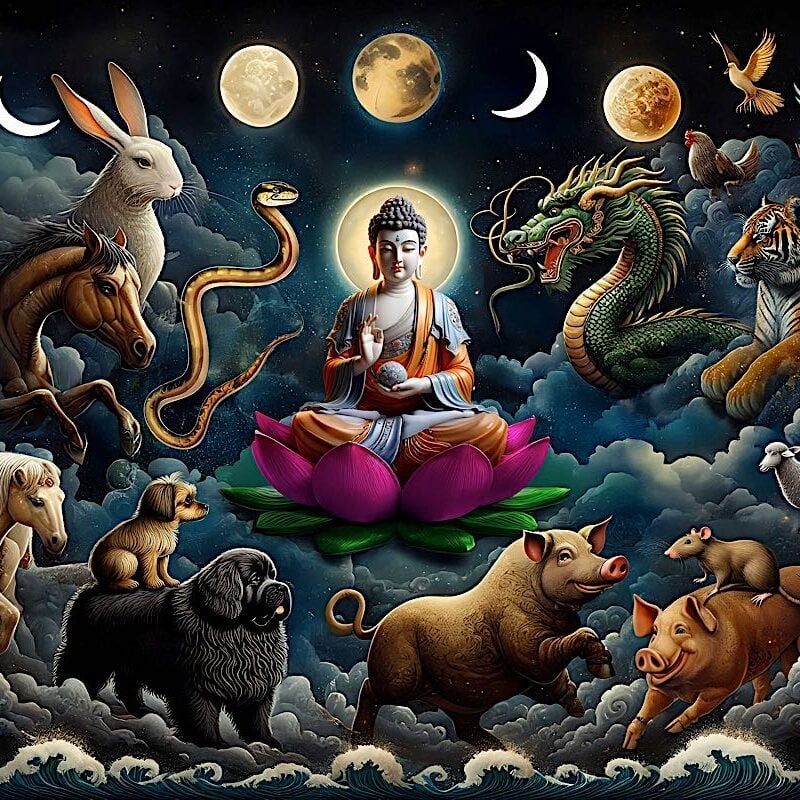
Who is my Enlightened Life Protector Based on Tibetan Animal Sign Zodiac in Buddhism? According to Mewa, Mahayana tradition and Kalachakra-based astrology (with Mantra Videos!)
Search
Latest Features
Please support the "Spread the Dharma" mission as one of our heroic Dharma Supporting Members, or with a one-time donation.
Please Help Support the “Spread the Dharma” Mission!

Be a part of the noble mission as a supporting member or a patron, or a volunteer contributor of content.
The power of Dharma to help sentient beings, in part, lies in ensuring access to Buddha’s precious Dharma — the mission of Buddha Weekly. We can’t do it without you!
A non-profit association since 2007, Buddha Weekly published many feature articles, videos, and, podcasts. Please consider supporting the mission to preserve and “Spread the Dharma." Your support as either a patron or a supporting member helps defray the high costs of producing quality Dharma content. Thank you! Learn more here, or become one of our super karma heroes on Patreon.
Lee Kane
Author | Buddha Weekly
Lee Kane is the editor of Buddha Weekly, since 2007. His main focuses as a writer are mindfulness techniques, meditation, Dharma and Sutra commentaries, Buddhist practices, international perspectives and traditions, Vajrayana, Mahayana, Zen. He also covers various events.
Lee also contributes as a writer to various other online magazines and blogs.




